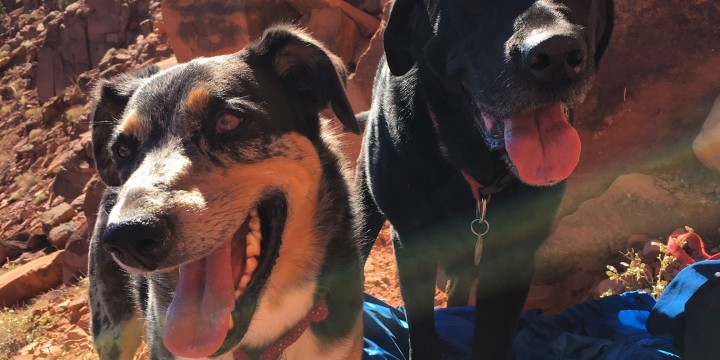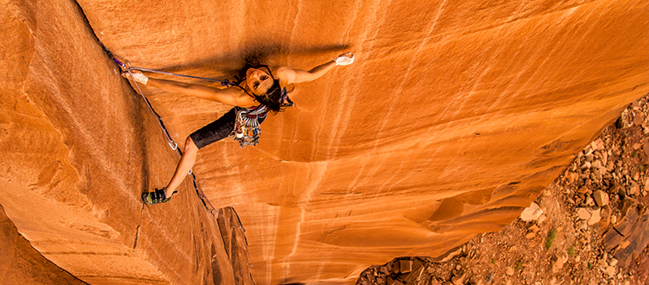
Soul Climbing
Hi Steph,
First, I’ve been following your career since I started climbing in 2010, read both your books half a dozen times, and want to thank you.Second, your books have helped me down my own path of writing and finding my voice. I wrote this today and wanted to share it with you; feedback is not necessary but would be appreciated. Knowing that I am a queer transgender girl who refuses to conform might help give it some perspective 🙂
Climbing fills a need I didn’t even know I had until I found the life. I live in a reality where precious few really see who I am; where I rarely have the power/privilege to be visible and heard. Walking through this reality steadily drains my strength and I begin to feel so weak and powerless. Then I go climbing; connected, both, to an ineffable piece of my soul buried deep within and an energy in the Universe that is transcendental. The strength returns; the ability to walk through the world as more than an empty shell, the ability to be present and centered in my body, I am hers and she is mine. Dysphoria caused by antiquated social norms that tell me, “Your body is not right!”, “Your gender is not right!”, “You are ours; to consume, to laugh at, to physically and mentally destroy if we so choose!”, is vanquished. The understanding to see my body’s beauty, grace, and ability; to hear, listen, and respect her, “Yes I can do that, go for it!” or, “Be careful don’t hurt us!” comes forth. There will never be enough words or the right words, so I’ll leave it with this; “Thank you climbing for helping me live.”
Thanks for your time, and thank you for bringing a much needed female presence and voice to the overall masculine climbing community.
Sincerely,
Jamie
Dear Jamie,
Thank you for writing. The things you’re talking about have been a lot on my mind for years and even more recently. Living on the fringe isn’t easy, but it forces you to see things deeply. Over time we learn that the struggle is the best thing we could have been given.
For many people, climbing is the path that leads us (sometimes painfully) to grow and to evolve. It’s not just about climbing. For others, climbing is a sport or a nice way to exercise. Or it’s fun for a while but gets left over time on the way to finding the thing that really does resonate.
For soul climbers, climbing is the way for us to become truly ourselves, to experience the mystery of the natural world and the even greater mystery of the interior universe.
The reason this has been on my mind so much is that I see our culture become more and more fixated on the concept of achievement and the illusion of winning of things. I see the media focusing endlessly on what I’ve always called the “firstest fastest mostest.” I’m endlessly queried by writers or producers about what I’m “doing next,” and will it be the “first?” or the “hardest?” or the “best?” Obviously I always say no. I mean, how ridiculous.
But as much as no one is ever truly the firstest fastest or mostest of anything, that’s the story that’s easy to tell and easy to sell, and climbing is increasingly reduced to this one-dimensional story. As with so many other things in this world we have made.
Decades ago climbers started to describe climbs in language of difficulty in order to give potentially life-saving information to others, to prevent people from getting on a route or a mountain that was harder or more dangerous than they were ready for. But somehow along the way from there to here, climbing ratings have become a very regulated and stringent measure of value. A way to determine who is the firstest or the fastest or the mostest, to see who is the “winner.” A way to measure a person against others and decide who is worth more, who is better, who matters more.
The last time I climbed in a gym, a friend told me to do the orange 12b because it was easy and not to do the yellow 11d because it was inordinately hard (he was right, I thought). These numbers don’t even seem to make sense or have useful meaning in the most controlled setting possible, inside a climbing gym. After 25 years of climbing, I still have no idea what to expect when I get on a climb rated 5.9 or 5.12. And yet we cling to these numbers, as meaning something about us and others, and we let it affect our perceptions of how good we are. I’ve seen people crying or swearing at a crag on a gorgeous, sunny day, because they fell off a climb of a certain number. And that’s one thing that’s really hard for me to stomach.
Climbing has become so quantified. Our world has become so quantified. As a climber living now in America in 2016, I don’t think there’s any way I could even imagine the act of climbing being extricated from accounting and bookkeeping at this point. How many times a day do we refer to routes as numbers at the crag or in the gym? And what does that even mean, really? Is that what climbing is about? To see how much we matter, according or compared to someone else? Why do humans want this so much?
Measuring oneself against others is a very artificial and rather empty way to experience the world, a type of motivation that is inherently limited and limiting. Climbing, in my view, is so much more than that.
Much more importantly, we all have value. And that value is not relative to anyone else and it can’t be measured by a number on a scale. That’s the real power and the real magic of climbing, is when it shows us a way to walk down that road of understanding.
That’s soul climbing.
It felt great reading what you wrote about it. We need more of that. 🙂
Steph







